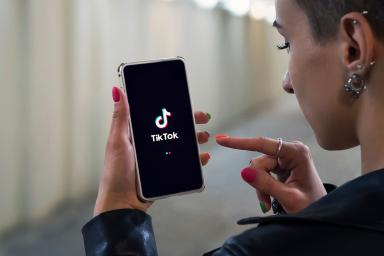Paid versus organic social media – how to leverage both
Social media can be a valuable way for start-ups to stand out and attract customers.
At the start of 2022, there were 57.6 million social media users in the UK, equivalent to 84.3% of the total population.
Most social media platforms, such as LinkedIn, Instagram, Facebook, and TikTok, allow creators to post both organic and paid-for content, with both types offering different benefits to businesses.
Paid-for social media is where you pay a fee to the social media platform to show your social media content to a specific audience.
Examples may be promotional posts offering a discount or a competition that encourages potential customers to follow your brand.
Organic social media is content you create and publish for free on your social media profile.
It may or may not be seen by a large audience, potentially limiting its impact and effectiveness.
You don’t have to select just one option.
By using both paid and organic content, you may effectively increase your brand’s chances of social media success.
Read more about how social media can help your small business.
What is paid social media marketing?
In simple terms, paid social media marketing is a form of advertising.
A business pays the social media platform a fee to ‘boost’ its content to show it to more social media users than it would reach naturally – known as ‘reach’.
In theory, by increasing the ‘reach’ of your social media content, more people will engage with your social media profile, such as leaving comments or becoming new leads or potential customers.
Post engagement can include likes, shares, website visits, and comments.
Paid social media content can take various forms, from posts, sponsored direct messages and influencer-generated content to pay-per-click (PPC) adverts and display adverts.
The cost of a paid social media marketing campaign will depend on what type of content you wish to boost and how long you want to boost it for.
The pros and cons of paid social media marketing
The pros of paid social media marketing
- may generate new sales leads
- can reach a larger audience
- targets ideal customers with custom filters
- allows direct communication with customers to announce new products and updates
- may increase visitors to your website.
The cons of paid social media marketing
- it may not be a long-term solution as it requires continuous spending
- it can become costly depending on how often it’s being used
- there’s no guarantee you will get a return on the money spent
- it can require consistent monitoring
- it’s highly competitive.
What is organic social media marketing?
Organic social media marketing is creating original content to share on social media platforms.
Businesses can use it to attract potential customers’ attention and showcase their brand’s personality and mission.
As no money is paid to boost content, organic social media marketing takes a ‘slow burn’ approach, focusing more on building brand awareness and trust by engaging with the community it builds rather than quickly gaining new leads or sales.
Organic social media can take many forms, including blogs, articles, social posts and sharing of other creators’ content.
The pros and cons of organic social media marketing
The pros of organic social media marketing
- may help businesses establish their tone of voice and personality
- can bring clients along every step of the buying process
- can act as an additional channel for customer support
- can allow you to build relationships with customers
- may increase brand awareness.
The cons of organic social media marketing
- it may not be a quick solution – organic content may take months to generate momentum
- it can be negatively affected by a platform’s algorithm in terms of users reached, making it unpredictable
- you can only access your direct followers (those who follow or subscribe to your account).
How to create a hybrid paid and organic strategy
Identify the right approach for your goal
Neither paid nor organic works for every action or goal you want to achieve with your social media marketing strategy.
If you want to announce a new product launch or leverage some well-performing organic content, putting some money behind that content could help you achieve the results you are after.
But organic could be the best option if you want to engage with customers or provide customer support.
It may be a good idea to test different approaches to learn if paid or organic is the most suitable route for your marketing goals.
Have a clear call to action
A social media post with no clear message or a call to action (CTA) can confuse potential customers and discourage sales or engagement.
Common CTAs can include asking your audience to visit your website, sign up for your newsletter, take advantage of discounted products or services you sell, or follow your business’ social media accounts.
With both paid or organic content, ensure your CTAs are timely and urgent – you want to encourage your audience to act now.
Use the target filters
While organic social media posts are seen only by your account’s direct following and via any hashtags you decide to use, paid social can be directed to appear in the feed of your potential customers.
All social media platforms provide a range of customisable filters for paid social media content.
These filters typically cover demographics such as age, gender, and location, as well as reported interests.
Using the filters provided for paid content can help boost your reach and put your content in front of a more defined and relevant target audience.
Boost well-performing organic content
You may produce organic social content that receives a great response from your immediate audience, but how do you maximise that response?
On most social media platforms, you can pay to boost organic content to reach a wider audience beyond just your followers.
Doing this could increase the post’s engagement rate and your business’s brand awareness.
Find the right social media platforms for you
The goal of your content may not translate onto every social media platform.
For example, announcing a sale may work well on Instagram with your target customer audience but may not work as effectively with professional networks on LinkedIn.
By determining the goal of a piece of content before posting and then deciding which platform to best use, you could increase the impact of your content and meet your goal.
Download our free Start Up Loans Social Media Toolkit to learn how to make social media work for your business.
Learn with Start Up Loans and boost your marketing skills
Want to market your start-up business? Check our free online courses in partnership with the Open University on effective marketing techniques.
Our free Learn with Start Up Loans courses include:
- Marketing in the 21st Century
- First steps in innovation and entrepreneurship
- Entrepreneurial impressions – reflection
Plus free courses on climate and sustainability, teamwork, entrepreneurship, mental health and wellbeing.
Tags related to this content:
Disclaimer: The Start -Up Loans Company makes reasonable efforts to keep the content of this article up to date, but we do not guarantee or warrant (implied or otherwise) that it is current, accurate or complete. This article is intended for general information purposes only and does not constitute advice of any kind, including legal, financial, tax or other professional advice. You should always seek professional or specialist advice or support before doing anything on the basis of the content of this article.
The Start-Up Loans Company is not liable for any loss or damage (foreseeable or not) that may come from relying on this article, whether as a result of our negligence, breach of contract or otherwise. “Loss” includes (but is not limited to) any direct, indirect or consequential loss, loss of income, revenue, benefits, profits, opportunity, anticipated savings, or data. We do not exclude liability for any liability which cannot be excluded or limited under English law. Reference to any person, organisation, business, or event does not constitute an endorsement or recommendation from The Start-Up Loans Company, its parent company British Business Bank plc, or the UK Government.
Your previously read articles
Sign up for our newsletter
Just add your details to receive updates and news from the British Business Bank
Sign up to our newsletter


